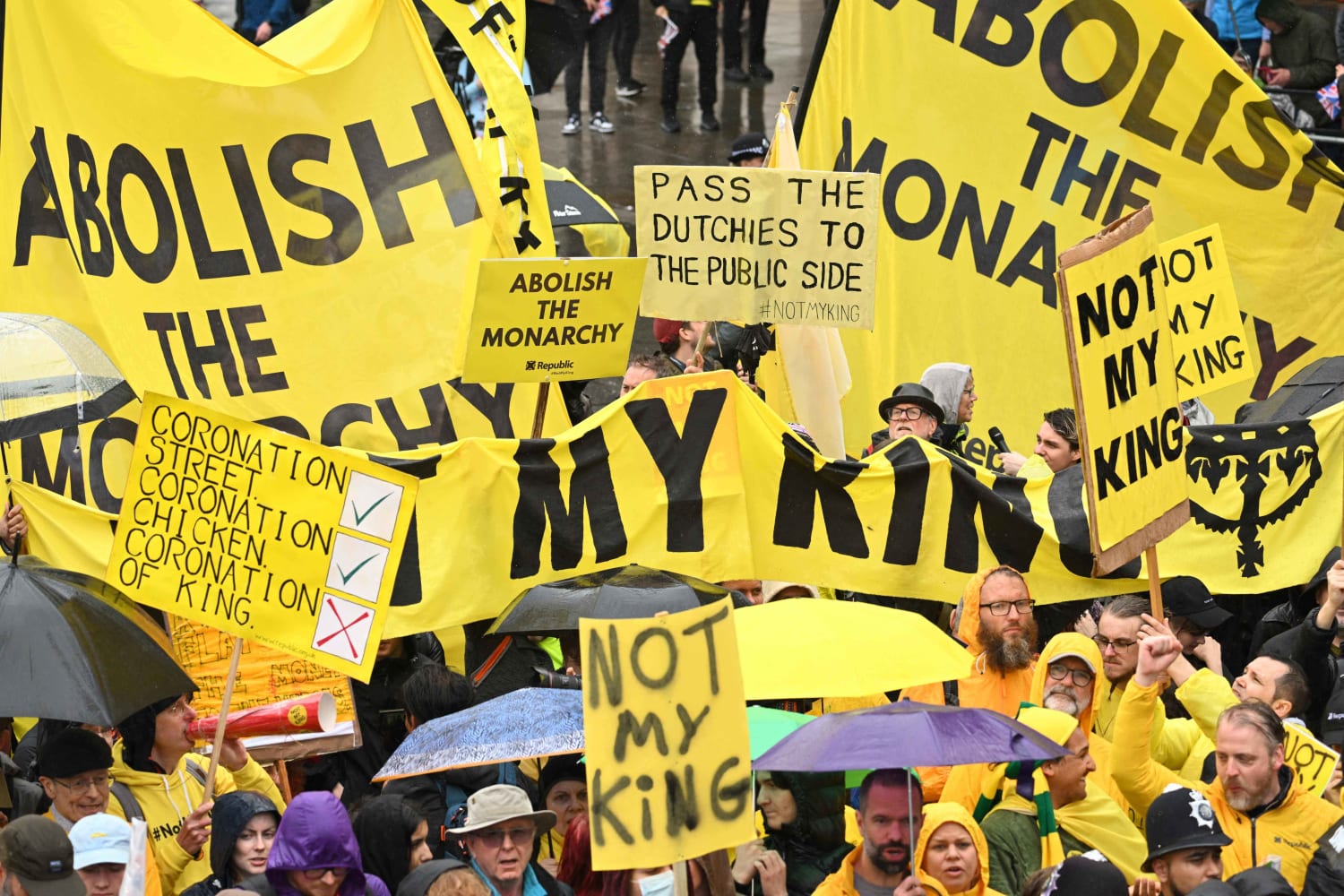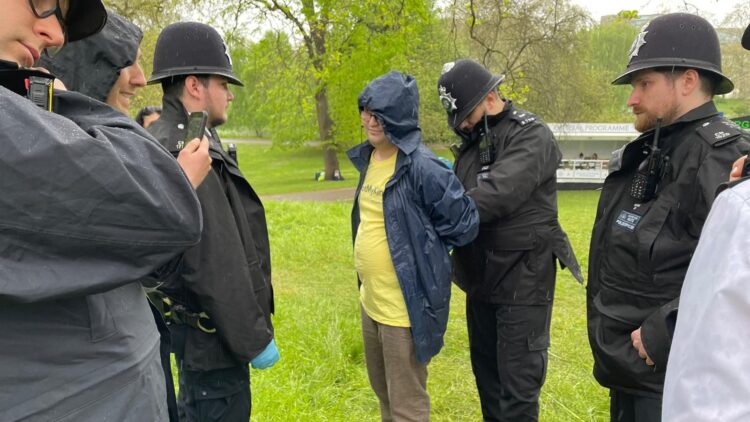By Gabriel Princewill-
The Metropolitan police is still considering a pre-action protocol letter brought by anti monarchist protesters during the King’s Coronation following arrests on May 6th.
The 14 day deadline for the pre-action protocol letter to be responded too has long lapsed, but there has been no further developments from either side regarding the matter.
Both Liberty and Dougherty Chambers which were acting on behalf of the protesters have said nothing about the threatened suit for alleged wrongful arrest.
Contact from this publications yielded no response, but reliable sources from The Met said the matter was still being considered.
There were further arrests at the latest crowning of King Charles this month.
Two women, Imogen Robertson, 22, and Hannah Torrance-Bright, 21, have been accused of trying to climb over a crowd barrier on royal mile. King Charles III was on that day presented with the Honours of Scotland – the country’s crown jewels – at a National Service of Thanksgiving in St Giles’ Cathedral on Wednesday.
The women are believed to be members of This Is Rigged – a Scottish pressure group that hopes to curtail the oil and gas industry.
However, the Crown Office and Procurator Fiscal Service (COPFS) said there would no further proceedings “after careful consideration”.
Regret
The Met initially defended the arrest of anti-monarchy protesters during the king Charles’s coronation to , citing the balance in rights between free expression and that of the right of assembly when arrests were conducted.
However, following some arrests of protesters, the Met expressed regret following the arrests of six demonstrators from the Republic campaign group in May during the coronation.

Protesters held banners calling for abolition of monarchy and stating ‘NOT MY KING’
The Metropolitan police later said a total of 52 arrests had been made for affray, public order offences, breach of the peace, and conspiracy to cause a public nuisance around the coronation.
An official statement from the Met to this publication regarding developments read: ”As part of the policing operation in central London for the Coronation a total of 64 arrests were made on Saturday, 6 May.
52 of these related to concerns people were going to disrupt the event, and arrests included to prevent a breach of the peace and conspiracy to cause a public nuisance.
14 of those people were arrested in Hackney and are on bail.
Enquiries are ongoing”.
Claims
Graham Smith, the head of the group, pushed for legal action and sent a pre-action protocol letter – a precursor to a law suit. The 14 day consideration period has long lapsed, but no straight action has followed yet.
Acting on his behalf of are the Dougherty Chambers an Liberty, both of whom are Human Rights Group who have been assessing complaints from some protesters.
Liberty confirmed to The Eye Of Media.Com that a pre-action protocol letter had been sent to the Met over some of the arrests, but said the matter was still being examined.
The Met police have no option but to either defend the suit, or seek to settle it outside court with the aggrieved parties. There is an argument to be had on both sides, and it is unclear who will back down in this potential tussle.
The Eye Of Media has been keeping a close eye on both the Met and the aggrieved party- the protesters- waiting for a sign of any legal implosion on this sensitive matter. Nothing yet.
Graham Smith, the chief executive of Republic, had been collecting drinks and placards for demonstrators at the main site of the protest on Trafalgar Square two hours before the king was due to arrive at Westminster Abbey when he was stopped along with five others by police on nearby St Martin’s Lane.
The group had been walking behind a rental van containing hundreds of placards when they were approached by the police and searched.
A video of an exchange with one of those arrested was caught on film at the time, and one police officer can be heard saying: “I’m not going to get into a conversation about that, they are under arrest, end of.”
The arrests were said to have been made despite a series of meetings and agreements between Republic and Scotland Yard over the demonstration, which was to take place at the point where Whitehall meets the Mall.
Smith was released by the Met police around 11pm that night at which time the majority of his Republic colleagues were reportedly still in custody. Posting to Twitter, Smith said there was “no longer a right to peaceful protest in the UK”.
“I have been told many times the monarch is there to defend our freedoms. Now our freedoms are under attack in his name.”
He hired liberty Human Rights and decided to lodge a suit for wrongful arrest against the Met, sending them a pre-action protocol letter.
A spokesperson for the Metropolitan police told this publication by phone that : ”In democratic societies, the right to protest and the right to enjoy celebrations or public events are fundamental aspects of individual freedoms.
”However, striking a balance between these rights can be challenging, particularly when the content of protests becomes offensive or disruptive”.
Representatives for the Met said they had kept track of several plans to organise the protests and had to determine where the balance was to be struck in some cases.
In cases where apologies were made by the Met, other reasons besides breaching the peace had been provided for the arrests, making the apology embarrassing and leaving the Met prone to legal attack.
Yet, other considerations give the Met a strong argument for justification for arresting certain protesters, if they had observed a clear plan to be disruptive.
In the event of a court battle, a judge presiding over this kind of matter will also have to consider the impact of precedent if it rules against the Met. It could encourage protesters to go to any lengths to obstruct a celebration. At the end of the day it is a very fine balance in matters like this”
Right To Protest
The right to protest is an essential component of democratic societies, enabling citizens to voice their dissent, raise awareness, and advocate for social change. Freedom of expression is a cornerstone of this right, protecting individuals’ ability to express their opinions, even when those opinions may be unpopular or offensive to some.
Some lawyers say that as long as protests remain peaceful and do not incite violence or hatred, individuals should generally be allowed to exercise their right to protest, even if the content of their message is controversial.
But equally important is the right of individuals to enjoy public celebrations or events under the right of freedom of as assembly and association. People attend events like the coronation to celebrate, commemorate, or simply enjoy themselves, seeking respite from their daily lives.
This right entails an expectation of safety, respect, and freedom from offensive behaviour or speech that may tarnish the experience for others.
Balancing the right to protest with the right to enjoy celebrations requires careful consideration and proactive measures by both protesters and authorities.
The Met spokesperson from the Metropolitan Police added: ”Its a fine balance, the right to protest must always be finely balanced with the rights of those who have assembled to enjoy an occasion.
Using the analogy of a wedding to assess the expected boundaries for protesters, the spokesperson said, ”protesters cannot come into the Church where the official ceremony is taking place and cite freedom of expression. If they were standing outside the Church, it would depend how close to the Church they are where people are enjoying the wedding.
Claire Coleman , a tutor and research analyst said: ”the fine balance must always take into account how much the protesters are disrupting the quiet enjoyment of those assembling to celebrate an event. Holding an offensive banner if it a reasonable distance away from the actual event will be within their right. Much will depend on how close they are standing, and if they are also disrupting it by what they are saying”.
”In the case of a protester arrested for displaying an offensive sign, the issue becomes more complex. While freedom of expression protects the right to convey provocative messages, there are legal and moral limits to this right.
”Offensive or hate speech, which incites violence, or poses a clear threat to public safety, is typically not protected under the right to free speech. If for example a protester was shouting ‘Not my King’ very close to a royalist who took offence and engaged the protester in row, the ptotester in that scenario can be seen as breaching the peace”
”What constitutes offensive speech can be subjective and may involve legal scrutiny.
Striking the Balance
”Balancing the right to protest and the right to enjoy celebrations requires open dialogue, proactive measures, and clear communication”, a police sergeant from the Midlands told this publication on the condition of anonymity’
”Law enforcement agencies have establish protocols and guidelines for addressing offensive speech or behaviour during protests, having fine regard to the competing rights of protesters and that of those enjoying the ceremony of the king’s coronation”.




